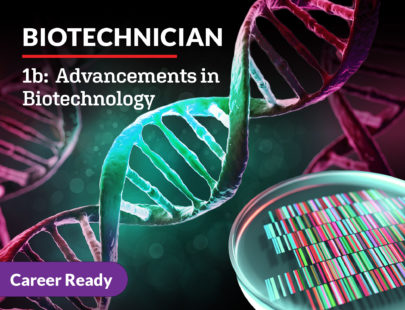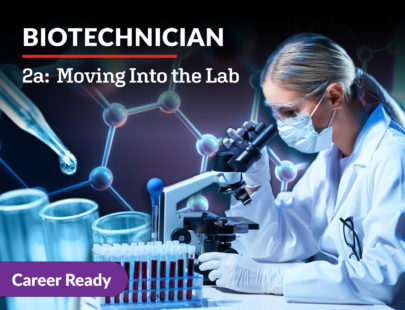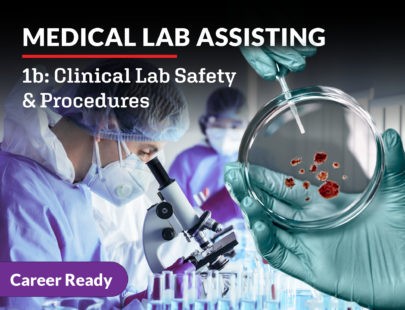
Biotechnician 2b: The Future of Biotechnology
You’ve examined the DNA of the biotechnology field, and now have a solid understanding of the day-to-day duties. In this course, you will build on the basics and learn how a career as a biotechnician could change the world! You will explore genetics- diseases, therapies, and testing, AI and precision medicine, CRISPR and agricultural sciences, and much more. You will also explore job opportunities in the field of biotechnology and tips for planning a career. Get ready to engineer your understanding of biotechnology!
Units at a Glance
Unit 1: Genetic Diseases and Gene Therapy
The history of medicine can be defined in four waves. The first wave was the golden age of drug development starting with the innovation of simple aspirin. The next wave came with the discovery of antibiotics and an end to bacterial pandemics. The third was the dawn of recombinant DNA technology and production of recombinant human proteins. Currently, we are experiencing the fourth wave with gene-editing technology that holds the potential to cure genetic diseases such as sickle cell anemia, cystic fibrosis, and even common neurological diseases. Many gene therapy clinical trials are underway to eventually make treatment of genetic diseases a reality. Let’s learn more about how biotechnology is changing medicine—and individual lives—for the better.
What will you learn in this unit?
- Discuss how medicine development has evolved and recall the use of CRISPR cas-9 technology in gene therapy
- Describe the symptoms and proteins responsible for common neurological diseases
- Explain the use of in vivoand ex vivo gene therapy for diseases such as sickle cell anemia or cystic fibrosis
- Demonstrate an understanding of CRISPR-cas9 and how it is currently used in clinical trials
Unit 2: Genetic Testing
Imagine you have discovered that a genetic disease runs in your family and now you are faced with the decision: to test or not to test, that is the question! It is a decision that should be well thought out before proceeding because although there are benefits from genetic testing, there are also risks. A genetic test that was once, not long ago, an expensive test only ordered by a physician, can now be obtained online with a keystroke. Considering the ease at which genetic testing has been made available by direct-to-consumer (DTC) companies, it’s more important than ever to stop and consider the consequences of genetic testing data to yourself and potentially your relatives who share common DNA. The benefits of genetic testing are many, as are the potential risks. Let’s learn more about this process so you can be fully informed about your options.
What will you learn in this unit?
- Understand the value of genetic testing and when it is appropriate to test for a genetic disease
- Describe a genetic test and how the Genetic Information Nondiscrimination Act (GINA) protects against genetic discrimination
- Discuss the risks and limitations of direct-to-consumer (DTC) genetic testing
- Explain the privacy issues surrounding genetic testing and how to protect your DNA data
- Define the role of a genetic counselor in educating clients about their genetic disease
Unit 3: The Era of Biological Drugs
Biological drugs (also known as biologics) are different from traditional drugs such as aspirin which are chemically defined and synthesized. Biologics are produced in living cells and, as such, are far more complicated in their size and structure and more expensive to develop and produce. Production of biologics exploits a microorganism’s ability to make DNA, RNA, and different proteins to give them a blueprint for making a specific molecule. Examples of biological drugs are vaccines, recombinant proteins, and monoclonal antibodies. Monoclonal antibodies are highly specific for a particular disease cell and can be produced against specific antigens such as those present on the surface of cancer cells and even viruses such as COVID-19. How are these drugs changing the future of medicine? This unit will explain.
What will you learn in this unit?
- Understand the difference between biological drugs and traditional drugs
- Explain how a monoclonal antibody is produced and used in medicine
- Discuss specific examples of diseases treated with FDA-approved monoclonal antibodies
- Define what cancer is and how biologics can treat it
- Describe the challenges of manufacturing and distributing biologics
Unit 4: Personalized Medicine
Instead of treating an entire population of cancer patients with the same drug regardless of the differences in their physiologies, genomes, and individual tumors, personalized medicine, as the name implies, tailors the treatment to the individual. Mutations in the tumor cells are identified, then the patient’s own T cells are reprogrammed and unleashed to target and destroy them with minimal impact on healthy cells. Degenerative diseases can be treated using a patient’s own stem cells. The positive effects of these treatments are life changing. Yet, the use of human embryos and cloning techniques are ethical issues in personalized medicine that must be carefully debated. How might personalized medicine affect your life one day?
What will you learn in this unit?
- Identify how personalized medicine using a patient’s cells is different from traditional approaches to medicine
- Discuss personalized immunotherapies such as amplifying a patient’s tumor-infiltrating lymphocytes or creating CAR T-cells
- Explain how a patient’s stem cells can be used to treat disease and describe the difference between somatic stem cells, iPS cells, and NT-embryonic stem cells
- Compare and contrast therapeutic cloning versus reproductive cloning of human embryos
- Argue the ethics and legalities of embryo modification and human cloning
Unit 5: Artificial Intelligence and Precision Medicine
The future of health care will use artificial intelligence to drive precision medicine. An individual’s health will be monitored from moment to moment, and risks of cancer and other diseases will be based on the individual’s whole genome sequence. Today, one of the most significant advances in artificial intelligence is the ability to determine the three-dimensional shape of all human proteins. This groundbreaking technology will speed up new drug development and understanding of disease.
What will you learn in this unit?
- Compare and contrast artificial intelligence and machine learning
- Discuss the uses of artificial intelligence in medicine and biotechnology
- Describe how artificial intelligence can be used to make precision medicine data-driven
- Explain how artificial intelligence is used to solve the three-dimensional structure of all known human proteins
Unit 6: CRISPR and Agricultural Sciences
World agricultural leaders are scrambling to find ways to feed an ever-growing population with crops that are falling subject to disease and drought. CRISPR-Cas9 technology offers a precise, cost-effective method for producing favorable characteristics in plants and animals by knocking out genes that interfere with the expression of those characteristics. Tomatoes that produce healthy chemicals, crops that resist browning, and plants with increased productivity are just a few of the changes CRISPR is making. CRISPR-edited biofuels can offset dependency on fossil fuels. Animals are even gene-edited to enhance favorable qualities that benefit the consumer. The ethics of using CRISPR technology to resurrect ancient animals or cause extinction of a mosquito population through the use of gene drives must be carefully debated as we move forward. These issues and many other CRISPR-related advances will be discussed in this unit.
What will you learn in this unit?
- Describe what CRISPR is, how it was discovered, and how it is used as a gene-editing tool in agriculture
- List ways CRISPR can contribute to feeding the world
- Discuss the many future contributions CRISPR will make towards crop improvements and affordable biodiesel
- Explain how and why animals have been modified using CRISPR technology
- Debate the ethics of using CRISPR for the de-extinction of ancient animals or the extinction of pests
Unit 7: Biotechnology Companies
There are thousands of biotech companies ranging in size from a few dozen to over 100,000 employees. Some have been around since the 1800s while some started recently in the 2000s. They provide products that range from vaccines for the prevention of disease, to monoclonal antibodies that fight cancer, to genomics that use artificial intelligence to match up the ideal drug to a patient’s own genome. But these innovative products do not make a great biotech company—the employees do. A commitment to ethics, sustainability, inclusion, and diversity gives back to the community, and these are all hallmarks of a great company.
What will you learn in this unit?
- Explain the aspects of a great biotech company from an employee’s perspective
- Define the distinctive features of a startup company
- List the biotech companies that are manufacturing biologics and cell-based therapies
- Discuss leading biotech companies that make vaccines and instrumentation vital to the biotechnology laboratory
- Describe companies that are leaders in genomics, sequencing, biomarkers, pharmacogenetics, and agrigenomics
Unit 8: Planning Your Biotech Career
Students who have earned a CTE Biotechnology Certificate are qualified to apply for many entry-level jobs in the biotechnology industry. This laboratory experience will be beneficial in obtaining a good internship in college and winning a competitive biotech position after graduation. It is important to research a company before submitting an application to make sure its culture and climate are a good fit for your goals, soft skills, and experience. A number of healthy work habits should be displayed after being hired including maintaining a strong work ethic, keeping a positive attitude, and supporting your departmental team. Where will your biotech knowledge take you in the future?
What will you learn in this unit?
- Discuss jobs you can attain with your CTE Biotechnology Certification that are consistent with your interests, experience, and soft skills
- Plan your college pathway to help achieve your future career goals
- Develop a job-seeking strategy that includes a great resume and professional network
- Prepare for your job interview and hone good work habits
Required Materials
Software
- Presentation software
- Word processing software
Optional
- Art supplies
- Audio recording device
- Digital camera
- Graphic design software
- Poster board
- Projector
- Spreadsheet software
- Video recording device
- Writing supplies




